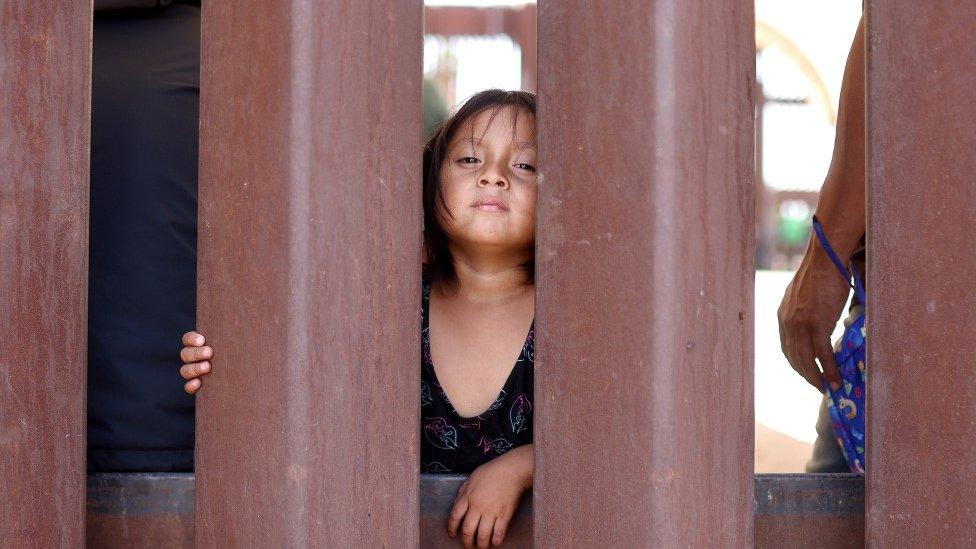Cities far from US-Mexico border still grapple with migrant crisis
- Published
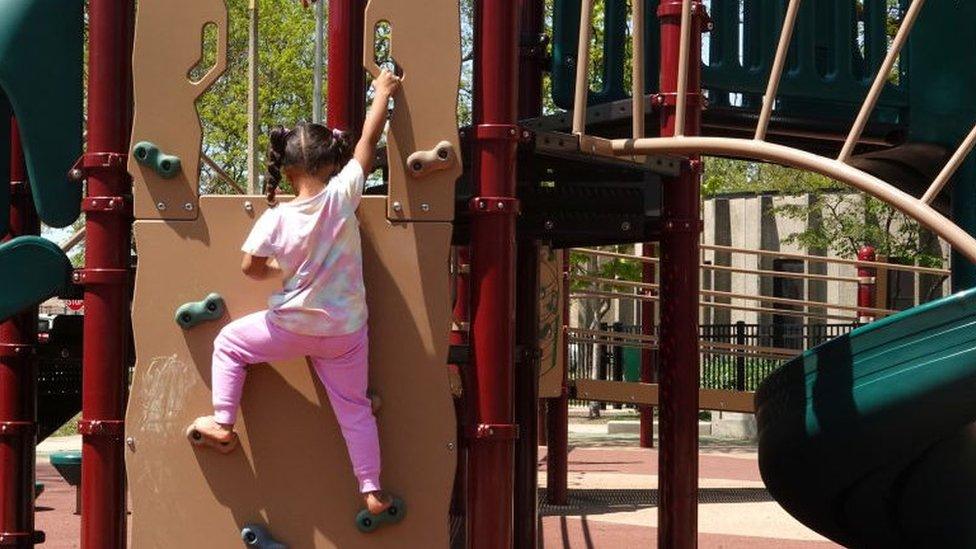
A migrant girl who arrived with her family from Venezuela plays in a Chicago playground earlier this week
Chicago, a city 1,500 miles (2,400 km) from the US-Mexico border, is struggling to provide for thousands of migrants sent from Texas on the orders of Governor Greg Abbott.
Other northern cities are also dealing with large numbers of new arrivals.
On Sunday, a bus carrying dozens of migrants from Texas arrived near Vice President Kamala Harris' residence in Washington.
And New York has requested additional funds from the federal government.
In Chicago, city officials say resources are exhausted. Since last summer more than 8,000 migrants have arrived in the city. It's estimated that an additional 100 to 200 are arriving each day.
They're being housed in police stations and churches, and some existing residents are upset at plans to convert a school into a shelter.
Chicago declares state of emergency
The number of migrants sent to Chicago is a small fraction of those who've recently entered the country from Central and South America. On the southern border, crossings are currently running at 10,000 per day.
But the influx prompted outgoing Mayor Lori Lightfoot to declare a state of emergency last week.
"We should all understand that this crisis will likely deepen before we see it get better," Ms Lightfoot said in a statement.
The declaration allows the city to access emergency funds and could result in the state's national guard being called in to help.
Officials are bracing for more arrivals after Title 42, the pandemic-era border policy that allowed swift deportations, expired last week.
The migrants began arriving in northern cities last summer as Gov Abbott, a Republican, attempted to put pressure on the White House to halt border crossings by sending newcomers to Democrat-run cities.
In a letter made public earlier this month, the Texas governor told Ms Lightfoot that she should take the matter up with the president.
"Until Biden secures the border to stop the inflow of mass migration, Texas will continue this necessary program," he wrote.
Other states have done similar.
Last September, Florida Governor Ron DeSantis flew 50 migrants to Martha's Vineyard, a wealthy island in solidly Democratic Massachusetts.
CNN reported that Florida is set to resume, external sending people north.
While the political fight continues, Chicago officials are struggling to find housing for migrants and are facing pushback from local residents.
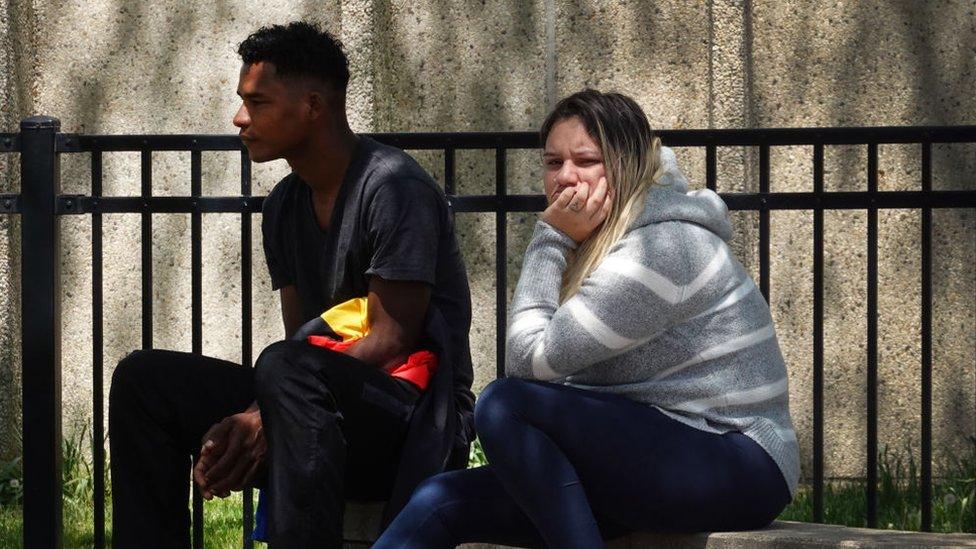
Migrant families from Venezuela watch as their children play in a Chicago park, where a field house has been converted into a migrant shelter
A proposal to convert a school
In South Shore, a mostly African-American neighbourhood on the city's south side, residents have filed a lawsuit aiming to stop a plan to convert an abandoned school into temporary housing for up to 500 migrants.
The neighbourhood, once fairly prosperous, has recently experienced pronounced economic decline.
At a recent public meeting about the school, which many locals hope could be turned into a community centre, some shouted "we don't want them here" and "send them back".
Frank Avila, a lawyer representing the residents, said that in contrast to the outbursts, most locals - including his clients - are open to immigration and have sympathy for the new arrivals.
However, he said, residents feel the migrants would be better served in wealthier parts of the city and that their voices aren't being heard.
"You need participation and consultation with the people in the communities where immigrants are placed," Mr Avila said. "Especially African-American people who feel like they're being displaced and don't have services."
A school in another south side neighbourhood was converted to a migrant shelter earlier this year over the objection of some residents.
Migrants are currently being housed throughout the city in police stations, churches, hotels and field houses in parks.
And a debate is brewing, external over more than 1,000 unused beds from a temporary Covid hopsital stored by the state's emergency management agency.
Watch: New York struggles to keep up with migrant influx
The city has not requested use of the beds, which has led to criticism from a city council member and others who argue it shows a failure to co-ordinate a response.
Migrants sleeping outside
"The shelters are full in the city of Chicago," said Antonio Gutierrez, co-founder and strategic co-ordinator of Organized Communities Against Deportation, a non-profit pressure group that is also marshalling support for the new arrivals.
Mr Gutierrez noted that around 400 to 600 people are sleeping in police stations - a number that fluctuates day-by-day.
The lack of space is so acute, Mr Gutierrez said, that when 75 migrants arrived at a police station last Thursday night, half had to sleep outside.
But he also said he understands why the South Shore residents oppose turning the old school into a shelter.
"Solving this issue is going to require much more than just converting a school," he said. "We're eventually going to have to find permanent housing for these individuals."
He predicted the crisis could stretch at least into the summer.
New mayor places blame on Texas
On Monday, Johnson, a progressive former union organiser who triumphed in the recent Chicago mayoral election, will be sworn in to replace Ms Lightfoot.
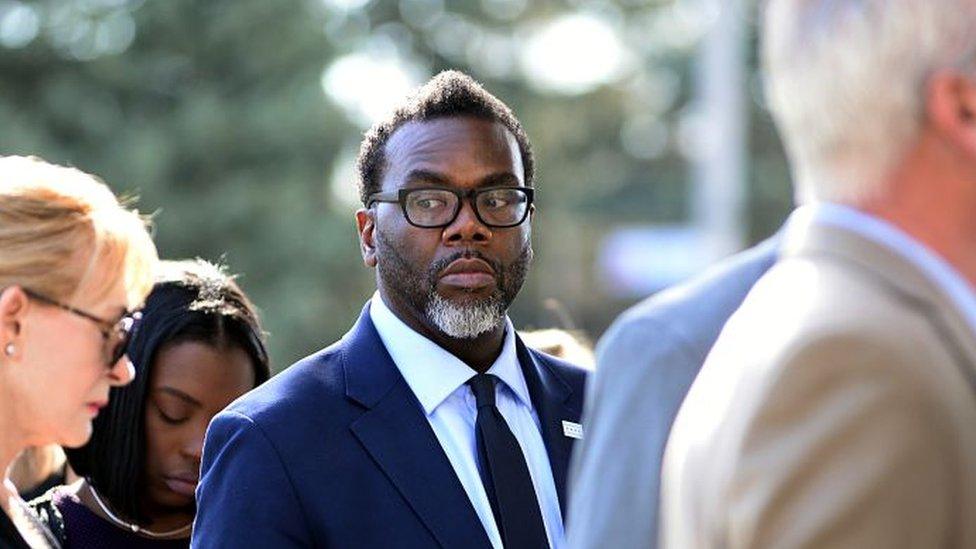
Incoming Chicago mayor Brandon Johnson
Mr Johnson's campaign did not respond to requests for comment, but the incoming mayor recently put the blame for the situation squarely on Gov Abbott.
"The political decision of governors along the border to try to stick it to us, and use people as political football is unconscionable," Mr Johnson told a public meeting. "I actually find it to be quite wicked and demented."
Mr Johnson has committed to keeping Chicago a "sanctuary city" - one where local laws protect immigrants from deportation - but has called for a comprehensive plan for new arrivals.
His campaign website accused previous city administrations of bulldozing their way through migrant resettlement decisions "without care or forethought".
- Published12 May 2023
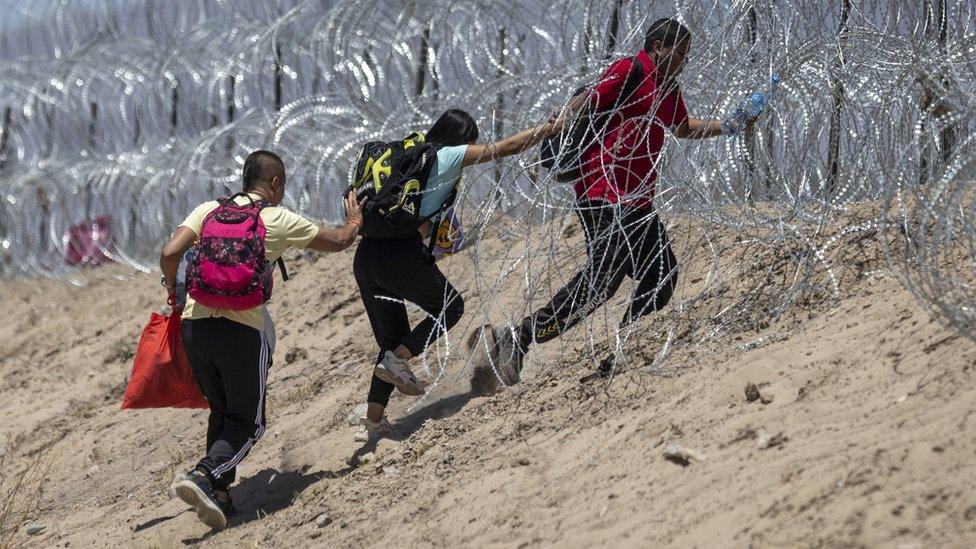
- Published11 May 2023
